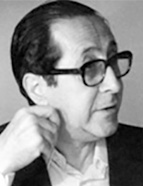

From the city of Op orto, in the period before 25 April 1974, he began an uninterrupted activity as an opposition activist. Unlike other historians with similar views, such as Joaquim Barradas de Carvalho, António José Saraiva, Vitorino Magalhães Godinho , or Flausino Torres, Armando Castro decided to stay in Portugal and continually fight against political power. Thus, he was a supporter of the Movimento de Unidade Democrática [Democratic Unity Movement] formed after the Second World War.
Sometimes , his professional occupation gave him the opportunity to defend opponents of the Estado Novo: this was the case with Óscar Lopes and Agostinho Neto, an anti-colonialist activist who became President of the Republic of Angola after the 25 of April. Armando Castro combined his militant activity with that of a writer. In 1958, he travelled around the then Portuguese colonies for four months in order to publish an underground book entitled O Sistema Colonial Português [The Portuguese Colonial System] . While he wanted to present a thorough analysis of Portuguese imperialism, he was also committed to defending the colonised: ‘This does not mean, in fact, that the author does not feel deeply the misery, suffering and physical degradation imposed on the colonial peoples and which are the result of the growing brutality and dehumanisation of the dominators’ ( O Sistema Colonial Português [The Portuguese Colonial System] , 1978, p. 23). A critic of Portuguese imperial policy, the book only appeared in Russian at this time, under the pseudonym Joaquim Silva, and in Portuguese in 1978, after the end of the dictatorship. Armando Castro also took part in the three conferences that brought together the opposition to the Estado Novo in Aveiro in 1957, 1969 and 1973, which were strong moments for the forces of democracy in Portugal. He was also an opposition candidate in the legislative elections for the Democratic Electoral Commission in 1969. Furthermore, his book Prisoneiros políticos, documentos de 1970-1971 [Political prisoners, documents from 1970-1971] , written with Luís Filipe Lindley Cintra and Francisco Pereira de Moura, was prevented from circulating by censorship. After 25 April 1974, he did not give up his political activity and remained loyal to the PCP. While many of the party ’ s former supporters moved away from its ideological line in the 1980s and especially in the 1990s, after the fall of the Soviet Union, Armando Castro never shifted his position. His active presence in the pages of Avante! and the funeral eulogy written by Óscar Lopes in this newspaper after Armando Castro ’ s death are signs of this commitment to the PCP.
This work is financed by national funds through FCT - Foundation for Science and Technology, I.P, in the scope of the projects UIDB/04311/2020 and UIDP/04311/2020.
